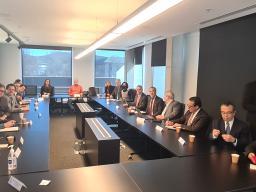From left to right: HE Mr Oscar Atehortua, Ambassador of Colombia; Mr. Noel Campbell, Co-Director of ANCLAS; Prof. Bruce Chapman, guest speaker.
ANCLAS hosted a roundtable meeting on 20 September at which Professor Bruce Chapman briefed Ambassadors and policy officers from 14 Latin American countries about Australia’s experience with income-contingent loans for university students. Professor Chapman was a key instigator of what became the Higher Education Contribution System (HECS) and later the Higher Education Loan Program (HELP) in 1989. The system opened up higher education to millions of Australians who might otherwise not have been able to afford it.
Under the system, the Australian government provides loans to students studying approved higher education courses and pays the amount directly to the education institution. Students can defer payment of tuition costs until their taxable income reaches a certain threshold at which time repayments commence through the Australian taxation system. The system avoids the challenges of time-based repayment loans which usually involve monthly payments regardless of the income and circumstances of the borrower - which often results in repayment hardship, default, and a negative impact on a borrower's credit rating. Professor Chapman discussed the partial implementation of income contingent loans in Colombia and the unique challenges and benefits this has provided.
In the ensuing discussion, participants exchanged views with Professor Chapman on the policy of governments in some countries to provide fully-subsidized education, the eligibility requirements for student borrowers, levels of interest charged for repayment, Australia’s record of recuperation of loans, and how an income-contingent loan system might be adapted to countries where the percentage of workers in the informal economy was very high.

